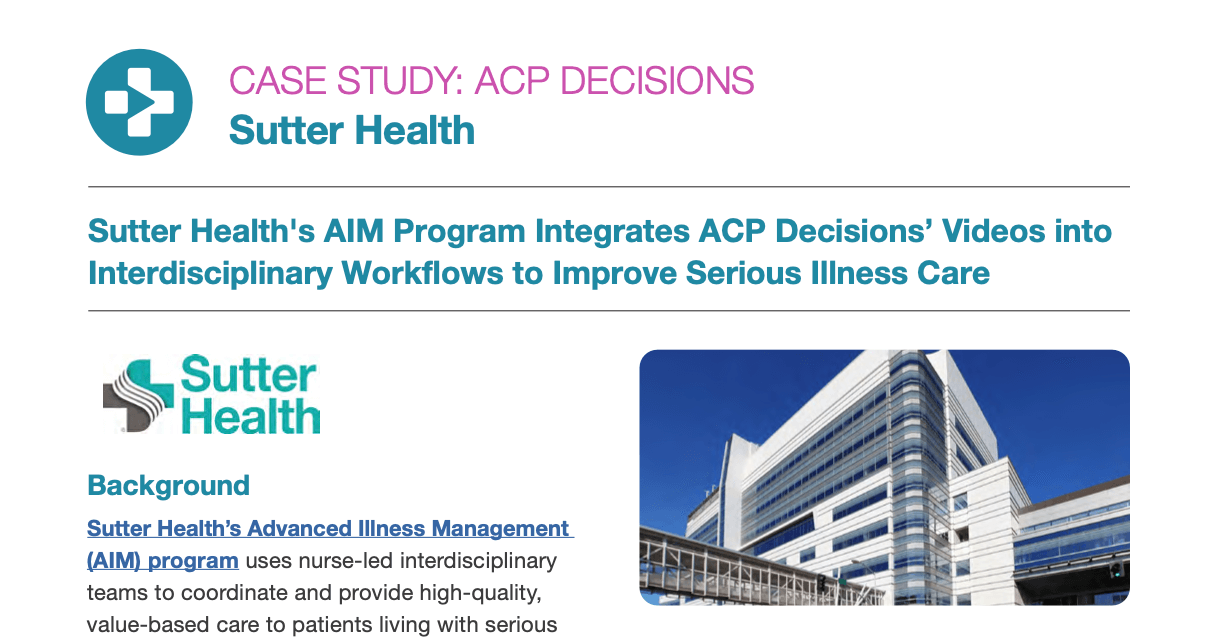IMPLEMENTATION | August 9, 2022
7 Tips to Avoid Medicare Advance Care Planning Denials
Reading Time: 3 minutes

Medicare began reimbursing providers for advance care planning (ACP) in 2016 to promote better health outcomes. While the number of claims has grown each year, the prevalence of physicians having end-of-life care discussions with their Medicare patients has remained low.
Despite the numerous benefits of providing ACP services, a recent study published in Health Affairs found that “fewer than 7.5% of beneficiaries who experienced recent onset of any of the conditions studied here or who died within the year had an advance care planning claim.”
Helping patients plan for the event they cannot make their own medical decisions should be essential to every physician’s practice. Providers who administer ACP and do not receive proper reimbursement are missing out on deserved revenue. Medicare claims denials are not uncommon and create more work for billing staff and delay payments. Here are seven tips to help providers minimize ACP claims denials.
1. Only Qualified Providers can Bill for ACP Codes
Medicare specifies that only providers who can bill for evaluation and management (E/M) services can bill for ACP. These “qualified health professionals” include physicians of any specialty, nurse practitioners, physician assistants and clinical nurse specialists. Other health professionals, such as licensed clinical social workers, psychologists, registered nurses, and chaplains, cannot bill for ACP codes independently – they must meet the requirements for “incident-to” billing under Medicare as well as any applicable state laws and scope-of-practice requirements.
2. Track and Document Time Spent on ACP
Since ACP codes are time-based, providers must carefully track and document the time they spend with each patient offering the service. Documentation should include the start time and end time of the conversation, the total amount of time, and specifically what is discussed. To qualify, the documented conversation must take at least 16 minutes in each code descriptor. Failing to include time in a claim will undoubtedly lead to a denial.
3. Be Timely About Filing ACP Claims
Based on provisions in the Affordable Care Act, providers must submit Medicare Part A and Part B claims within 12 months, or one calendar year, of the date of service. With some rare exceptions, late claims will be denied and cannot be appealed.
4. Make Sure to Bill the ACP Add-On Code Appropriately
Billing improperly for an add-on code without billing for the primary code (99497) is a common reason for claims denials. Primary code 99497 can be billed for the first 30 minutes of the conversation. But if the conversation is less than 16 minutes then a different code (e.g., E/M code) must be used. To bill primary code 99497 and add-on code (99498), the conversation must be at least 46 minutes or at least 16 minutes longer than the initial 30 minute block.
5. Be Specific When Documenting for Multiple ACP Visits
Qualified providers can bill for ACP services provided separate times to a patient. Medicare does not limit how many times ACP can be billed whether for multiple days during a month or year. Providers can even file claims for more than one ACP visit on the same day. To minimize the chances of denial, practitioners should provide complete documentation about the purpose, such as a change in health status, and/or what was accomplished, such as a new advance directive completed.
6. Do Not Bill Separately for ACP Provided During the “Welcome to Medicare” Visit
End-of-life planning is included as part of the Medicare Initial Preventive Physical Examination (IPPE), also known as the Welcome to Medicare preventive visit, per the patient’s consent. Every Medicare beneficiary is eligible for one IPPE during their lifetime no later than the first 12 month after enrollment.
7. Include a Diagnosis Code and the Code Modifier for AWV Claims
ACP is considered an optional and billable service that can be provided during the Medicare Annual Wellness Visit (AWV). A diagnosis code that is consistent with the patient’s exam is required when submitting an ACP claim as part of the AWV. For reimbursement, Medicare also requires ACP to be:
- Provided on the same day as the covered AWV
- Billed on the same claim as the AWV
- Billed with modifier -33 (Preventive Services)
- Provided by the same provider as the covered AWV
For more specific information about ACP claims, billing, and reimbursement, check out the following resources:
- Billing and Coding: Advance Care Planning (CMS)
- Medicare information website
- Advance Care Planning MLN Fact Sheet
- Physician Fee Schedule (CMS)
Are you interested in offering advance care planning services to your patients? We can help. Contact us today to learn more!
Please note: The information provided in this blog post is an overview and based on our best understanding of billing Medicare for ACP as of the published date. It does not guarantee payment. Healthcare providers and organizations should consult with their local billing expert for specifics on CPT code reporting, billing, and reimbursement.
You might also like...

Sutter Health’s AIM Program Integrates ACP...
CASE STUDIES, IMPLEMENTATION | < 1 MIN READ


